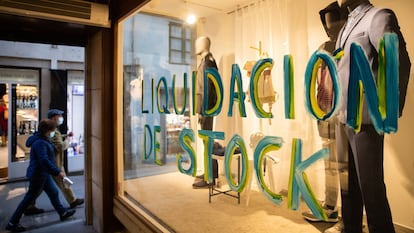Spain’s coronavirus paradox: ‘I have more savings than ever’
Uncertainty about the future and the fall in consumption due to lockdown measures have led to a sharp spike in deposits, but will this money remain in the bank or help the country’s economic recovery?

Pilar Ruiz is something of an oddity. At the height of the coronavirus pandemic in April, while the world seemed to be falling apart and requests for Spain’s ERTE furlough scheme were flooding employment officers, the 33-year-old was promoted in her job as a business analyst for a real estate agency. Her 27-year-old sister Beatriz, stayed where she was: working as a resident doctor at a health center in Aravaca and doing shifts at the Puerta de Hierro hospital in Madrid.
Pilar works from home and no longer drives the 15 kilometers that separate her home in Madrid and the office. Indeed her car has hardly left the garage. She no longer wears makeup or puts on perfume, as she tries to reduce her outings to a minimum. She also canceled her plans to travel to Africa this summer.
Beatriz also has a long list of things that she stopped doing during the spring lockdown and hasn’t returned to: going to the cinema, concerts, restaurants and traveling. Overwhelmed by the workload and almost always in hospital scrubs, she has barely bought new clothes.
It makes you feel a bit bad that while you continue to earn money there are people begging for foodBeatriz Ruiz, doctor
The spring lockdown had a big impact on consumer behavior, with the closure of public-facing stores significantly reducing shopping opportunities. This factor, combined with greater uncertainty about future earnings, has led to a surprising phenomenon: household savings have skyrocketed. According to the National Statistics Institute (INE), by the end of the third quarter, savings had reached a record high 22.5% of disposable income. The latest figures from the Bank of Spain back this conclusion: as of September, households in Spain had an unprecedented €760 billion in cash deposits. Even over summer, when savings traditionally fall due to holiday spending, the figure continued to rise.
But according to experts, the rise in household savings has only been experienced by public servants, salaried workers and pensioners, who have continued to receive monthly payments throughout the crisis. “The workers who haven’t lost their job or been placed on an ERTE, those who are on indefinite contracts and can work remotely are saving a lot,” says Ignacio Conde-Ruiz, the deputy director of the Foundation of Applied Economy Studies (Fedea) and a professor at Madrid’s Complutense University. “But if you have a temporary contract and lost it, if you have been placed on an ERTE or are at risk of poverty, you can’t save. It’s very asymmetrical, very unequal with respect to income levels,” he adds.
It is one of the paradoxes of the pandemic. The fall in consumption – which dropped 23.9% in the second quarter – has hurt workers with precarious conditions, the self-employed and business owners, but increased the savings of retirees, salaried workers and public workers, who have not seen their income hit by the crisis. In other words, those who have lost their purchasing power due to the pandemic will not spend more than they need to because they can’t, and those who have gained purchasing power will not do so either because they are worried about economic uncertainty or are limited by coronavirus restrictions.
Beatriz says that she “clearly” has more savings now than ever. But she is worried about the economic hardships much of the country is facing. “It makes you feel a bit bad that while you continue to earn money there are people begging for food. But that’s what public aid is there for,” she says.
Experts warns that spending habits may be permanently scarred by the psychological impact of the pandemic
Conde-Ruiz believes that it would have been better for the government to have sped up the guaranteed minimum income scheme or offered temporary aid to the worst-affected families, instead of raising the wage of civil servants at a time when there is negative inflation. “Not only would it have been fairer, but it would also have had a larger spending multiplier, because [hard-hit families] are definitely going to spend it because they don’t have the capacity to save, while a public official will save a part out of precaution,” he explains.
The last trip 71-year-old José Luis Muñoz-Cobo made was to Argentina last December. This summer the former nuclear engineering professor decided to break with tradition and not go on any long holiday. He recognizes that thanks to his savings and pension, he has little in the way of financial uncertainty, but says that he has earned this after working for nearly 46 years. The pandemic, however, has not left Muñoz-Cobo completely unscathed: he has agreed to accept part of the rent on his property at a later date until the situation improves, and his pension plans which are linked to the stock exchange have been negatively affected.
Emilio Ontiveros, the president of International Financial Analysts (Afi), highlights that it is spending associated with behavior that is falling. Fixed expenses, like the mortgage or rent, remain the same and in some cases, like electricity, gas and internet bills, they are rising.
Miguel Ángel Rozas, who has been working at Spain’s state-owned bank Instituto de Crédito Español (ICO) for 27 years, agrees with Ontiveros. He says he has not been able to save, despite being a public worker, explaining that he is spending more now that he is working from home. He spends more on internet data and heating, and allows himself to buy more expensive groceries as he is eating at home. He also bought a special ergonomic chair. “It’s a bargain for businesses. They don’t pay for air conditioning, cleaning, water, electricity or even security,” he says. Some companies, such as Afi, have helped remote workers cover the cost of equipment like chairs or desks, but the practice is not widespread.
The workers who haven’t lost their job or been placed on an ERTE, those who are on indefinite contracts and can work remotely are saving a lotIgnacio Conde-Ruiz, deputy director of the Foundation of Applied Economy Studies
There is an upside to the rise in household savings. “I think next year when the vaccine arrives, these saving reserves will end up being spent,” says Ignacio de la Torre, an economist of the investment firm Arcano. He believes that Spain’s gross domestic product (GDP) rose more than expected in the third quarter because the return of household spending was underestimated. A report by Arcano, titled The Post-Covid World, argues that there will be a strong rise in consumption. “Let’s remember that the great tragedy of the Spanish flu of 1918-1919 was not followed by collective depression, but rather the happy and wild years of the 1920s,” the report reads.
The European Commission is also optimistic, although more cautious about the long-term prospects. In its autumn forecast, published at the beginning of November, it predicted that the fall in consumption “will be followed by a relatively strong rebound next year, as households gradually release accumulated savings and adjust their spending patterns to the pandemic reality.” But it added: “Private consumption growth is, however, forecast to moderate in 2022, largely due to lingering uncertainty about job and income prospects which are likely to keep precautionary savings elevated.”
The big question now is how much will the rise in savings, plus the support from European Union’s recovery fund, will contribute to more spending, more growth and more employment. Ontiveros warns that our spending habits may be scarred by the psychological impact of the crisis. “The pandemic has strengthened the perception of vulnerability. The 2007 [financial] crisis was a big scare. It created the general perception that the economic system was more vulnerable than we thought. And this is being internalized.”
English version by Melissa Kitson.
Tu suscripción se está usando en otro dispositivo
¿Quieres añadir otro usuario a tu suscripción?
Si continúas leyendo en este dispositivo, no se podrá leer en el otro.
FlechaTu suscripción se está usando en otro dispositivo y solo puedes acceder a EL PAÍS desde un dispositivo a la vez.
Si quieres compartir tu cuenta, cambia tu suscripción a la modalidad Premium, así podrás añadir otro usuario. Cada uno accederá con su propia cuenta de email, lo que os permitirá personalizar vuestra experiencia en EL PAÍS.
¿Tienes una suscripción de empresa? Accede aquí para contratar más cuentas.
En el caso de no saber quién está usando tu cuenta, te recomendamos cambiar tu contraseña aquí.
Si decides continuar compartiendo tu cuenta, este mensaje se mostrará en tu dispositivo y en el de la otra persona que está usando tu cuenta de forma indefinida, afectando a tu experiencia de lectura. Puedes consultar aquí los términos y condiciones de la suscripción digital.









































